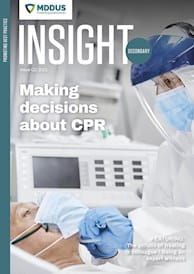SOCIAL media has quite literally changed the world. In 2020 is was estimated that 63 per cent of the world’s population uses social media to communicate and access or share information, a number which is only set to increase. Safe to say, included in this number are many healthcare professionals using social media in both their personal and professional lives.
Social media offers many advantages for the secondary care team. It allows engagement in public health and policy discussions, enables the establishment of national and international professional networks, and also facilitates patient access to information about health and services. As the use of social media becomes ever more widespread, it’s essential to remind ourselves that the standards expected from us are not diluted simply because we are behind a screen.
Blurred boundaries
MDDUS receives frequent enquiries about the use of social media by healthcare professionals. Queries vary from what information can be shared to concerns about the content of a colleague’s advice or post. When it comes to patients, the message is clear - you should ensure that social and professional boundaries do not blur. If a patient contacts you about their care through a private profile, you must be clear and explain that you cannot mix social and professional relationships and, where appropriate, direct them to your professional profile.
Many doctors only use professional social media sites which are not accessible to the general public. However, it is important to remember that patient confidentiality remains the cornerstone of medical practice and no identifiable information about patients should be disclosed on such sites.
You should also be mindful that it is harder to maintain your own privacy or anonymity online. Even if you post information anonymously, in many cases, it can be traced back to its point of origin. So please, exercise caution when posting online, as you will be held accountable for your opinions, advice and posts and may be expected later to justify the content.
Courteous communication
Communicating with colleagues via social media can be immensely helpful. Where else can you get the opinion of several thousand colleagues with the click of a button? Modern medicine should embrace the benefits of social media and the wealth of information it provides. However, communicating in this manner does mean that any opinion, information or advice you share may remain online indefinitely and could leave you open to criticism from colleagues. If you find yourself in the midst of a disagreement, remember to maintain the same high standard of professionalism that you would in a face-to-face discussion.
Clinicians who behave unprofessionally on social media can and have been held accountable. I am aware of several professional conduct cases in recent times that involved healthcare professionals who were openly rude and critical of members of the primary and secondary care team, not only as colleagues but also as patients. So it’s always important to remind ourselves of the standards we must uphold whilst online.
The General Medical Council makes clear in Good medical practice that doctors must:
- treat colleagues fairly and with respect
- make sure that your conduct justifies your patients’ trust in you and the public’s trust in the profession
- maintain patient confidentiality when communicating publicly, including speaking to or writing in the media. You should remember when using social media that communications intended for friends or family may become more widely available.
Take a few moments
At times work can get stressful and become frustrating. It can be tempting to share your thoughts and feelings about a colleague, patient, specialty or particular clinical treatment online. Wait, reflect and consider any comments before making them. Are they professional? Would you say the same things in person? If the answer is no, then you may wish to think of other ways to make your point or provide feedback.
GMC ethical guidance makes it very clear that doctors should show respect for colleagues online. Doctors’ use of social media states:
- You must not bully, harass or make gratuitous, unsubstantiated or unsustainable comments about individuals online.
- When interacting with or commenting about individuals or organisations online, you should be aware that postings online are subject to the same laws of copyright and defamation as written or verbal communications, whether they are made in a personal or professional capacity.
So, as we advance digitally and embrace the use of social media in medicine, we must not forget that what we say and how we say it is still important. Our colleagues and patients expect us to behave professionally at all times, whether we are communicating face to face or online.
ACTION POINTS
- Make yourself aware of current GMC guidance surrounding social media.
- Remember that any opinion, post or comment remains online and may remain accessible even if you delete.
- Consider whether you should say something online you would not say in person.
- Always maintain patient confidentiality.
- Anonymity online is not guaranteed.
- Remain professional online and do not act in a manner that discredits your position and your profession.
- If you have any particular concerns about professionalism online, contact advice@mddus.com to discuss further.
This page was correct at the time of publication. Any guidance is intended as general guidance for members only. If you are a member and need specific advice relating to your own circumstances, please contact one of our advisers.
Read more from this issue of Insight Secondary

Save this article
Save this article to a list of favourite articles which members can access in their account.
Save to library
